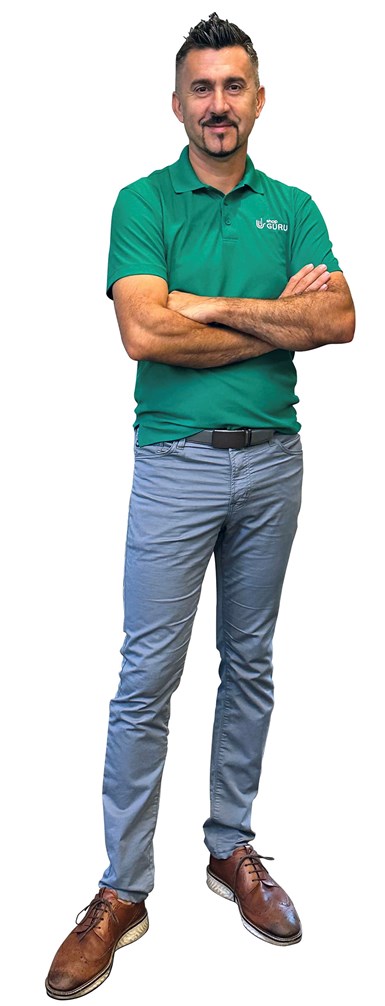How I Made It: Boris Soldo
Coming from the war-torn Balkans, Boris Soldo started working in a machine shop at 18 years old. Over the next thirty years he founded his own successful shop and gone on to found the software company Shopguru.
Share



I first had exposure in manufacturing when the war in Bosnia and Croatia started. I was 15 or 16 years old when my whole world collapsed in front of me. My family was fortunate enough to escape the war zone, and somehow we ended up as refugees in Germany.
At 18 years old, I was looking for a job and applied to a bunch of temp agencies. I was assigned to a machine shop and had never seen anything like it before. I didn't know what machining was. All I had to do was basically set the parts in the fixture and hit the button. I did that for about six months.
As the company was growing, they were looking to train people. My interest became pretty intense because I wanted to know how this was done. You know, what makes this machine do the things that it does? Their manufacturing engineer said, “Do you wanna try to do this?” He just started explaining G code to me and how it all works. I got in front of a computer and had a 2D drawing next to me. I had to do the math to figure out the position of the hole. And honestly, the first time I made a program, and I stuck this piece of metal in there and created something that came out… it was extraordinary! I could say I made this. That was eye opening to me.
Fast forward from 1994 to ‘99. We had an opportunity to immigrate to the United States. I ended up in a very small machine shop in Buffalo. I was going to college in the evening, and I was running a lot of this equipment on my own. As I was getting closer to graduation, I got a job offer at an engineering company in Buffalo, but I always had this idea that I could have a machine shop on my own. Keep in mind when I came over to the U.S., I barely spoke any English. My goal was always to graduate, but at the same time I saw a huge potential. Hypothetically, if I can acquire one or two machines and start doing this on my own…
I basically declined the position as a manufacturing engineer and applied for a loan in 2005. That’s how I started Solmac. Very quickly, our business snowballed. We started with small orders and started getting more and more work — most of it coming from other machine shops. Within three to four years, we decided to purchase a building in Buffalo, and unfortunately that time was 2008.
One of the only industries at the time that was doing well was medical. We had to invest into equipment that would support the industry that still had a pulse. We made it through, and soon after the recession the purchase orders went back up and we got back to the work that we used to do.
After spending close to 12 years in the industry, I still felt overwhelmed, like I did a lot myself. I started to brainstorm what I could do to empower my machinists, to give myself freedom and have time to do the things that are critical for business. I started to look for software that could help me, and the only thing I could find out there were ERP systems. ERPs are definitely necessary to run the business, but for the part operator it was not enough. One day, I just thought, “Maybe I can come up with the software to do this?” I started developing Shopguru. In 2022, I sold the machine shop and strictly focused on Shopguru.
Coming from a war-torn country to the greatest country in the world, not able to speak the language, not having a name, not having backing from anywhere, and basically from nothing, I could create a multi-million dollar company and be able to sell it and start another company and keep going. I’m living proof that there is huge potential for a lot of young people to just take a chance and learn about manufacturing.
Related Content
How I Made It: Harry Moser
Harry Moser has seen manufacturing flourish and contract in the U.S. over a career that has lasted over 50 years. Now, he’s part of the vanguard reshoring manufacturing in the U.S. Find out one simple change he believes could bring 1,000,000 manufacturing jobs back to the U.S. in the latest installment of How I Made It.
Read MoreHow I Made It: Aneesa Muthana
Aneesa Muthana grew up helping out at her parents’ Chicago grinding shop before striking out on her own in the ‘90s. When business slowed down dramatically, she embraced change and built her machine shop into a modern facility using Swiss-type CNC machines.__PRESENT
Read MoreHow I Made It: Sherry Davies, CEO & President of T.J. Davies Co.
How do you transform a family machine shop into a thriving business while staying true to its roots? Sherry Davies recounts her path from childhood visits to her father’s machine shop to leading the business through growth and change. Here, she talks about her personal growth as a shop leader, her commitment to American-made products, and her lead-by-example philosophy.
Read MoreHow I Made It: Craig Cegielski
Craig Cegielski tells us about the founding and successes of student-run manufacturing business Cardinal Manufacturing and offers advice for setting up a student-run manufacturing business in your own school district.
Read More





















.png;maxWidth=300;quality=90)




